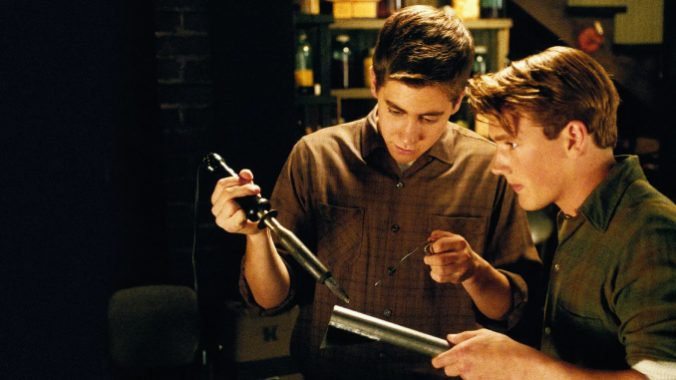The Warm but Dishonest Comfort of October Sky

A prompt going around on the internet has been to “name something you remember watching on this,” the “this” in question being a familiar picture for anyone with a public-school education in America: A rolling stand with a TV set strapped to it. “Wheeling in the TV” was one of the best fleeting moments of relief in public education. We’d all exhale, and say to ourselves “Ok, we’re not learning anything today, thank god.” But one particular answer to this prompt struck me, and surely struck many my age: 9/11. By virtue of being seen on the same platform and in the shadow of the event, the movies that we saw on that TV in school had an intrinsic attachment to one of the biggest tragedies of our lifetimes. Especially growing up in Central/North New Jersey, where a large portion of the population commutes to Manhattan for work, 9/11 was an all-encompassing shadow that didn’t really ever lift. One of the immediate films that sticks in my mind alongside it is Joe Johnston’s October Sky. Despite coming out in 1999, it was a movie that, looking back, seemed particularly directed at countering the feelings we teenagers had about the direction the country was going after 9/11—a remedy of sorts, sending us back to an America that existed before “all this” happened.
October Sky has been buried in our memory of Jake Gyllenhaal’s filmography because it came before his breakthrough role Donnie Darko. October Sky’s reviews marked the film as “old-fashioned” and, while it had comparable, marginal box-office success with Darko, its lasting cultural impact was markedly less, particularly because it didn’t have the kind of cult notoriety the latter would acquire. Yet it has stuck in my mind despite it failing to exhibit any remarkable qualities in artistry or entertainment, simply because it’s such a movie of its time, a time which overlapped with the beginning of my adolescence when I was particularly enamored by these kinds of dramas.
October Sky is draped in the genial warmth of burnt-yellow painterly sunsets, the rugged struggle between working class traditionalism—represented by Chris Cooper as a stern coal miner father—and a future of tech and exploration seen in the eyes of his daydreamer son Homer J. Hickam Jr. (Gyllenhaal). The latter, of course, was most important to the school board who assigned it as part of the curriculum: A student inspired by a teacher who believes in his potential. All in all, October Sky lacks the cynicism that began to become more commonplace in post-9/11 cinema.
While October Sky was made and released at the tail end of the 20th century, it takes place in 1957, right at the beginnings of space exploration. The first sequence is a TV broadcast of the Sputnik 1 rocket launch. As Homer becomes more and more interested in rocketry, he finds that support will only come outside of his tumultuous home life, in the form of high school science teacher Miss Frieda J. Riley (Laura Dern). He still pines for his father’s approval however, and the film’s central propulsion comes from the tug-of-war between Homer Jr.’s starry-eyed ambition and his father’s lunch-pail practicality. One major theme throughout the film is to foreshadow the upcoming space race between the United States and the Soviets, though the movie presents Homer as someone genuinely interested in science rather than someone with a hankering to prove American exceptionalism to himself and others. This comes as a double-edged sword, as his curiosity for science runs headlong into an incuriosity for history, one matched by the filmmakers.
-

-

-

-

-

-

-

-

-

-

-

-

-

-

-

-

-

-

-

-

-

-

-

-

-

-

-

-

-

-

-

-

-

-

-

-

-

-

-

-








































